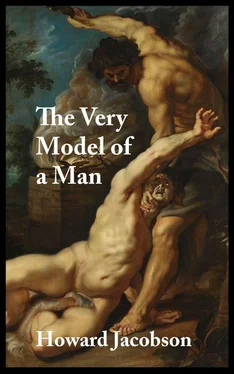What do you think? Not a word of this to your father?
And I put my finger first to my own, then to her lips, and said nothing, because there is no sensation more exquisite for a son than to be conscious of conspiring with his mother against his father, and I was so moved I could not speak.
*
Could not, and — when I recall that devilish, masterly, motherly inflection — still cannot…
What do you think?
What do you think?
What do you think?
Who would not have Adam near his conscience if he could be italicised by Eve?
Meanwhile, in another clearing in the forest, which the day before had been a desert, and the day before that a flood-plain, and tomorrow could be a swamp or sand-dune, the Adam in question, the father to whom not a word, not a word… was putting the finishing touches to a bold campaign. Not knowing that his wife had been decisively returned to him as a temptation too hot for divine essences to handle, he was just seconds from launching his strategy to win her back.
It is a moot point whether we would have been in time to stop him, even supposing we’d been free to speak; and it is another whether he would have thanked us for it had we tried. Months of planning had gone into this. Months of practice and memorisation and workmanship and — it goes without saying — anticipation of success.
I had not seen much of him for some time. He was up early and worked late, and I was up my tree, working even later. But when I did run into him I thought he had never looked more conformable to himself. It suited him to be purposeful, to have a definite objective, spiced with vengeance, to aim at, and to have all his faculties expectant, in a state of perpetual rehearsal. He appeared less confused about what his hands were for. He was not subject to those implosions of temper whose source was a mystery to him. He was not regularly to be found hanging from the short rope of his own patience. Although he had not completely stopped crying in the night, I fancied I could deduce from those cries that he was sleeping better, dreaming dreams in which he was not always stamped back into the earth, reduced to those original granules who were his only ancestors. I might have been mistaken, but there were some nights when I thought he actually laughed in his sleep, rejoiced and exulted like a man who was at last the author of violence, and not just its bewildered victim.
But he remembered his manners when the time came. We heard him from a distance, my mother and I (oh, and Abel too), while we were still in a slithery seaweed embrace — the viscous memory of the angel between us yet — and we exchanged glances of approval, raised a combined eyebrow, surprised that without us Adam had found words and resolution.
O Lord, our Lord, he extolled, Whose name in all the earth is excellent, chastise me not for what I am to ask, but be merciful unto me, and say: How many more will be the days of my wife’s separation?
I trembled for him. He did not know what a bad hour he had chosen to sue for mercy or to speak of wives.
The heavens remained mute. Gave no intimation that they had heard him, let alone were considering Their reply.
Then my father spoke again. O mighty God, Who shaketh the wilderness with great winds, and maketh the sun to shine upon us, and taketh our fear from our hearts, give ear unto my prayer. How much longer is my rightful wife to be kept from me?
And just as he had amended his tone, from entreaty to vexation, so did he appear to have amended himself, vanishing from where he had first preferred his appeal, some thirty angel-lengths (taking Semyaza as a standard) to the east of us, and materialising again in the west, no more than nine or ten prone Azaels away.
Still the heavens shut Their ears against him.
O Lord of Hosts, my King and God, he began again, only this time his voice was fainter, seemed to have desert in it and to be borne in upon dry winds from afar — O Lord of Hosts, Who out of the horrible nothing of miry clay brought me up and breathed into my nostrils, and stuck arrows in my side, and planted the thorn in my right foot and the thistle in my left, and cut me off from Thy presence and from the presence of she whom Thou, in Thy everlasting bounty, provided for me, and cast me back into the lowest pit of darkness; O King, wilt Thou now cause Thine anger towards me to cease, and tell me to the homer, to the ephah, yea, even to the hin, how much more uncleanness one wife can have in her?
But before this sandy psalm had been completed another was in progress, and then another, and then another still. All at once my father’s voice was everywhere around us, echoing rarefied and flinty from the arduous heights of our lifeless mountain, issuing muffled and sappy from inside the barks of the very trees that shaded us, welling up waterlogged and spluttering — P-l-l-lo-lo-lentiful as ar-r-r-re Thy blo-blo-blessings, O-lo-lo Lorrrd my Godle-oddle — from the pebble-ebbled beds of cold running rivers. The whole of nature seemed to have rallied to his cause. Impervious stones stood up for him, toothless worms became eloquent on his behalf. Every blade of grass, every splinter of stone, every unfeeling atom, had been Adamised, and spoke as he spoke.
Because we — his astonished family — were unsighted, we missed the best of it. We caught the sound effects but lost out on the animation. It was only later that we discovered the extent of my father’s ingenuity, that he had not thrown his voice indiscriminately — remarkable achievement though that was, to make the mountains and the desert talk — but had aimed his words at specific targets, assigned them to the mouths of complainants fashioned in the image of himself, by himself, and stationed high and low where God the Jealous Potter was bound to see them the moment He looked down: a hundred Adams modelled out of clay or cut from rock or carved in wood, with heads made from potatoes, melons, cabbages, and each wanting to know how much longer, how much longer, the days of his wife’s separation.
For years Abel and I went on finding remains of these effigies, some of which bore a striking, though most no more than an approximate, resemblance to our father. Those made out of vegetable or fruit were, of course, rotten and fly-blown, the home of termites and leucous-bellied grubs, the sanctuary of snails and slugs by the time we came across them, and of use to us only in a philosophic sense. But the stone ones weathered well, losing only beards and noses, and otherwise retaining so much of their life-likeness that Abel kept a couple which he played with as toy brothers, setting them against each other in imaginary conflicts. To this day I have an especially fine example in my belongings, and although I never attended sufficiently to my father to learn the art of ventriloquism, I do sometimes try to make it speak, to make it say, Bleh! bleh! bleh! and Very good and Right and I have spoken, and to get it to agree to forgive me for what I did.
Whether God ever forgave my father his usurpation of the Creative Urge, whether in fact He did not choose finally to punish him with me — I am not the one to say. But His wrath was indubitably kindled when at last, driven to near distraction by the universal complaint my father had orchestrated, He drew back the curtains of the skies and beheld the full extent of the blasphemy:
Whole hillsides peopled with puppets… with their mouths open… and their fists raised… and mutiny on their lips.
‘Ye shall make you no idols nor graven image,’ He said — spake rather, for truly this was SPEAKING. ‘Neither —’ Said the puppets: We are not idols.
‘Neither rear you up a standing image, neither shall ye set up any image of stone, to bow down unto it —’ Said the dummies: We are not bowed down unto.
Читать дальше











